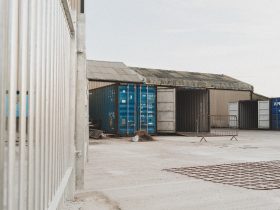Are you a container home enthusiast looking to achieve water independence? Look no further! We’ve compiled a list of sustainable water solutions for your container home.
Off-Grid Water Harvesting in Container Homes
Off-grid water harvesting is a great way to achieve water independence in your container home. Installing a rainwater collection system is an easy and efficient way to harvest rainwater for all your water needs. By collecting water from your roof and diverting it into a storage tank, you can use this water for everything from washing dishes to watering your plants.
Container Home Greywater Systems
In addition to harvesting rainwater, you can also install a greywater system in your container home. Greywater is the wastewater from your sinks, showers, and washing machines. By installing a greywater system, you can treat and reuse this water for non-potable uses, such as flushing toilets or watering your garden.
Water Recycling in Container Living
Another way to achieve water independence in your container home is through water recycling. By using a water recycling system, you can treat and reuse your wastewater for non-potable uses. This is a great way to conserve water and reduce your water bill.
Efficient Water Use in Container Homes
One of the easiest ways to achieve water independence is through efficient water use. By installing water-efficient fixtures, such as low-flow showerheads and toilets, you can reduce your water usage and save money on your water bill.
Container Home Water Storage Techniques
Water storage is an essential part of achieving water independence in your container home. By installing a water storage tank, you can store rainwater for use during dry spells. Additionally, you can use this stored water to irrigate your container garden.
Eco-Friendly Water Practices for Containers
There are many eco-friendly water practices you can implement in your container home. For example, using biodegradable soaps and detergents can reduce the amount of harmful chemicals that end up in your greywater system. Additionally, using a composting toilet can reduce your water usage and provide valuable fertilizer for your container garden.

Off-Grid Container Home Water Supply
If you’re looking to achieve complete water independence in your container home, an off-grid water supply may be the solution for you. By installing a well or other off-grid water source, you can completely eliminate your reliance on municipal water.
Water Filtration for Container Dwellings
If you’re using a well or other off-grid water source, it’s important to install a water filtration system. This will ensure that your water is safe to drink and use for other purposes.
Container Home Water Conservation Tips
Conserving water is an important part of achieving water independence in your container home. Simple tips, such as fixing leaks and turning off the water while brushing your teeth, can make a big difference in your water usage.
Innovative Water Management in Containers
There are many innovative water management techniques you can implement in your container home. For example, using a living wall to filter and reuse greywater is an eco-friendly and visually appealing way to conserve water.
Container Home Self-Sufficient Water
By combining rainwater harvesting, greywater systems, and water recycling, you can achieve self-sufficient water in your container home. This is a great way to reduce your water bill and help the environment.
Off-Grid Container Home Plumbing
If you’re looking to achieve complete off-grid living in your container home, you’ll need to install an off-grid plumbing system. This can include a composting toilet, a greywater system, and other water management techniques.
Sustainable Irrigation for Container Gardens
If you’re growing a container garden, it’s important to use sustainable irrigation techniques. Installing a drip irrigation system is an efficient way to water your plants without wasting water.
Container Home Water Recycling Innovations
There are many innovative water recycling techniques you can implement in your container home. For example, using a blackwater treatment system can treat and recycle your wastewater for non-potable uses.
Rain Barrel Systems for Containers
Installing a rain barrel system is a simple and efficient way to harvest rainwater for your container garden. By collecting water from your roof, you can save money on your water bill and reduce your environmental impact.
Green Technologies for Container Water
There are many green technologies you can use to manage your container water. For example, using a solar-powered water pump can reduce your reliance on grid electricity and help you achieve off-grid living.
Off-Grid Container Home Water Purification
If you’re relying on an off-grid water source, it’s important to install a water purification system. This will ensure that your water is safe to drink and use for other purposes.
Container Home Water Collection Methods
There are many water collection methods you can use in your container home. For example, using a gutter system and downspouts to collect rainwater is a simple and efficient way to harvest water for your needs.
Water-Efficient Fixtures for Container Living
Installing water-efficient fixtures, such as low-flow showerheads and toilets, is an easy way to reduce your water usage in your container home. This can help you achieve water independence and save money on your water bill.
Container Home Water Recycling Solutions
Water recycling is an important part of achieving water independence in your container home. By using a water recycling system, you can treat and reuse your wastewater for non-potable uses.
Strategies for Sustainable Container Water
By combining rainwater harvesting, greywater systems, and water recycling, you can achieve sustainable container water in your home. This is a great way to reduce your environmental impact and save money on your water bill.
In conclusion, achieving water independence in your container home is not only possible, but it’s also easy and affordable. By implementing these sustainable water solutions, you can reduce your environmental impact, save money on your water bill, and achieve the ultimate goal of off-grid living.



















Find Us on Socials